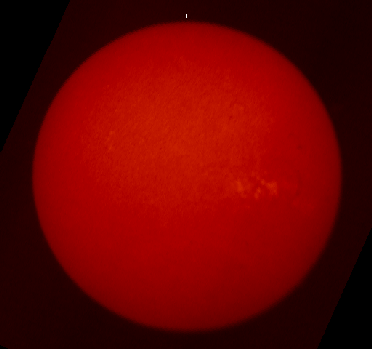Astronomy Picture of the Day
Discover the cosmos!
Each day a different image or photograph of our fascinating universe is
featured, along with a brief explanation written by a professional
astronomer.
May 18, 1996

The Sun Today
Credit:
Space Environment Center,
NOAA
Explanation:
Our Sun shows a different face every day. The above picture was taken on
May 15, but a similar picture of the
Sun actually taken today can be found
here.
The above picture was taken in red light and so is shown in red. The
bright spots to the right of center are active regions known as
plages.
Currently, the
Sun is showing very few active regions or sunspots, and is considered to be in a solar minimum. Solar
activity will pick up over
the next six years until a "solar maximum" is reached. The Sun goes
through this cycle of maxima and minima every 11 years.
Sol,
our Sun, is
hundreds of times more massive than all the
planets in the Solar System
combined. However, the
Sun itself contains only a small amount of the total
angular
momentum of the Solar System.
Tomorrow's picture: Nearby Dwarf Galaxy Leo I
| Archive
| Index
| Search
| Glossary
| Education
| About APOD |




Authors & editors:
Robert Nemiroff
(GMU) &
Jerry
Bonnell (USRA).
NASA Technical Rep.:
Sherri
Calvo.
Specific rights apply.
A service of:
LHEA
at
NASA/
GSFC




